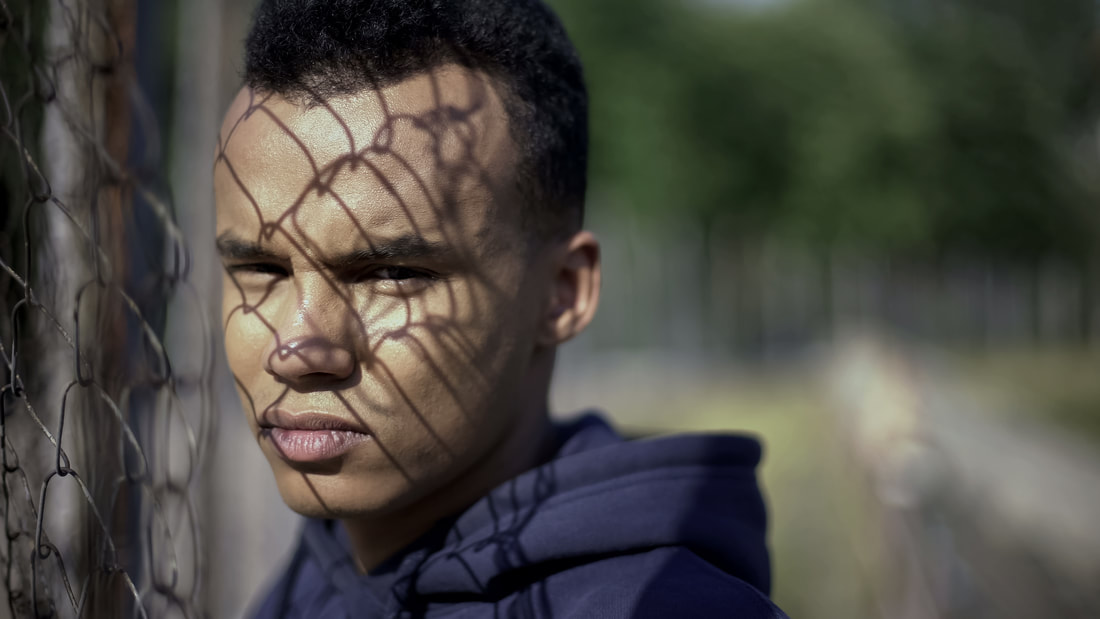|
I spent much of my early childhood touring the various residential congregate care facilities where my older brother spent ages 10 to 14. I became used to fawning at the residential treatment counselors for treats and scavenging old toys that the clients forgot. Above all, I refrained from seeking emotional help from parents, teachers, or doctors, lest I get spirited away to a facility, the way my brother and others in my community did.
The threat of being removed from my home was ever-present for me and my friends. Speaking up would leave us vulnerable to entering the child welfare or juvenile detention systems. This phenomenon of whisking kids away from their communities, often for random offenses or emotional difficulties like truancy or self-harm, can prime youth for the prison system. While a lot has changed in child welfare since I was a child, in 2017 a study found that 37.4 percent of U.S. children will have a child welfare involvement by their 18th birthday. For Black kids, the lifetime risk of child welfare involvement increases to over 50 percent. Throughout the ‘90s and the 2000s, federal investigations, whistleblowers, and research revealed massive shortcomings in the handling of young people in these institutions, from excessive and forced medication to abuse from staff. There were also a number of high-profile incidents, including deaths of children due to restraints and a massive legal conspiracy to send vulnerable youth to inappropriate, often violent facilities. Despite these issues, congregate care remains a primary source of behavioral health care for system-involved youth in the U.S. In fact, increasing numbers of parents are resorting to relinquishing their children to the foster care system in a desperate effort to meet their needs. This may be due to the fact that rates of depression, suicidality, anxiety, and alienation are spiking among American youth, while many families lack access to adequate mental health care. Since the COVID-19 pandemic began, the number of youth experiencing mental health crises has risen rapidly, exacerbating these existing issues. The number of children who have experienced the death of a caregiver, have lived through gun violence, or are facing housing insecurity has increased too. As the youth mental health crisis rages on, this country’s weak youth support system faces a crossroads. Congregate facilities have faced steady reductions in their populations, as well as increased closures due to advocacy from survivors. In perhaps the most high profile example of this advocacy, Paris Hilton—who says she was abused as a teen in a Utah congregate care facility—has in recent years pushed to pass the Accountability for Congregate Care Act (ACCA), which would establish federal protections for youth in residential care. At the same time, child welfare and behavioral health systems have been slow to adopt a wide range of accessible, effective strategies to address youth mental health issues, especially for low-income young people. Instead, local governments continue to send kids with complicated psychosocial cases to congregate care facilities. Demi Burgess is a web developer who was sent to VisionQuest, a large youth-care agency accused of child abuse with facilities in several states. He told The Appeal he was removed from his home and sent to a VisionQuest facility in rural Pennsylvania after missing too many days of school. “I was 17, I had missed a lot of school, and all of a sudden, I’m in a courtroom, getting sentenced, I’m in a holding cell, now we’re driving five hours away,” he said. To Burgess, this mirrored how adults in his community got booked and disappeared. The judge never asked why Burgess was truant, and his mother did not have the tools to advocate for him. “Kids [at VisionQuest] were as young as 12,” Burgess said. “If we follow the logic that getting booked puts you at risk for returning to prison, this puts kids in prison early, so when they get out they aren’t scared of returning.” Municipalities must grapple with how they will reduce congregate care populations, while still addressing the massive mental health needs of our nation’s youth. In a 2021 qualitative study engaging survivors of congregate care, the research and advocacy organization Think of Us recommended that residential facilities, group homes, and other similar facilities be completely abolished due to widespread abuse within those systems. A majority of the study’s participants supported abolishing the U.S.’s current child-welfare institutions and replacing them with systems that focus more heavily on foster care, work to place children with kin as much as possible, provide more support to foster parents, and accommodate childrens’ preferences as much as possible. Some solutions are already being put to use across the country. Along with the pending ACCA legislation, 2018’s federal Family First Prevention Services Act increased funding for helpful alternatives like the recruitment of youth-friendly foster families and short-term crisis stabilization programs where youth can stabilize in short-term psychiatric stays rather than languishing in institutions for months and years. In Philadelphia, where I live, youth who have survived congregate care have successfully launched an ombudsman program meant to advocate for youth experiencing mistreatment within congregate care. Expanding the use of community-based mentors, or advocates, for low to moderate level juvenile offenders has also proven effective in multiple states in reducing long-term reliance on systems for youth support. Other promising practices include peer support for parents of youth with behavioral issues and the creation of youth community-based clubhouses. Speaking to The Appeal, Burgess recalled a cousin who was paired with a youth advocate in lieu of placement in congregate care. The pair spent quality time together instead. “He’d come home happy, talking about all the fun he just had with his advocate, and I’d think, ‘Wow, I want that.’ Maybe something like that—an adult who actually cared would have helped me with my truancy.
0 Comments
Leave a Reply. |
HISTORY
April 2024
Categories |
© Walk 4 Change. All rights reserved.


 RSS Feed
RSS Feed